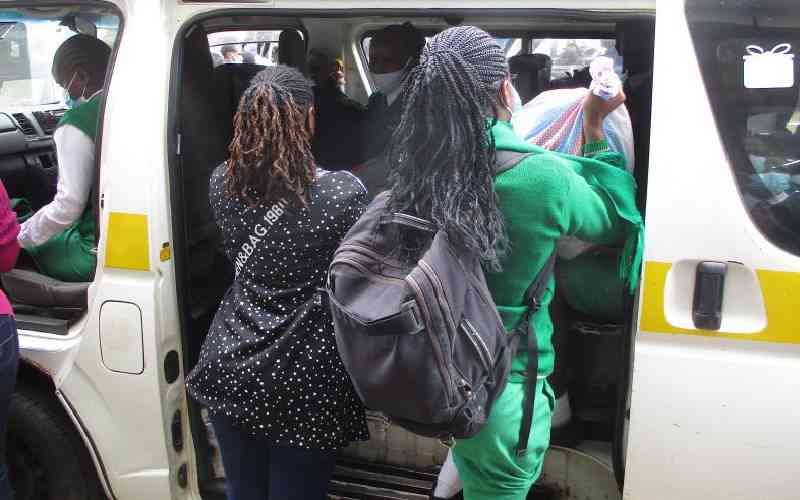
With schools resuming their academic programmes after half term, parents have to dig deeper into their pockets due to a hike in fare across most routes.
Following an upward review of fuel prices by Energy and Petroleum Regulatory Authority (Epre) on Friday, commuters have to pay more as players in the public transport adjusted fare to sustain their operations.
Boda boda operators and Public Service Vehicles on some routes have adjusted fare to enable them sustain operations following fuel prices increment by Sh13 per liter of petrol and Sh11 for diesel.
Some operators along the Eldoret-Kapsabet route had increased the fare from Sh200 to Sh250.
David Chepkwony, a matatu operator, claimed that changes in fuel prices have adversely affected the transport sector because passengers are taking long to adjust to the situation.
Petrol stations in Kapsabet town and its environs sold a litre of petrol at Sh195.6 and diesel at Sh 178.3.
There was adequate fuel in most filling stations, but a handful of motorists, including matatu and boda boda riders, turned up to fuel in Kakamega, Bungoma, Vihiga and Busia due to hikes.
Some fuel traders suspended operations on Friday afternoon, waiting for Epra to announce new prices. In Western, petrol retailed at Sh195 per litre while diesel and kerosene retailed at Sh179 and Sh173.
Erick Onyango, a petrol station attendant at AFTAH Petrol station in Kakamega town, said the business had picked up at slow note, as people were not buying as usual.
Ordinarily, Onyango would sell fuel worth Sh200,000 to Sh300,000 by mid-day before Epra announcement. There were no customers at his filling station by around 2pm on Saturday.
A 14-seater minibus PSV driver, Isa Abdalla plying Kakamega-Lwandeti route, said they are experiencing difficult times.
Collins Indama, a boda boda operator in Kakamega town, said they were buying a litre of petrol at Sh200, which can no longer guarantee him more trips.
In Nakuru, petrol stations witnessed reduced customers.
Johnson Wekesa, a representative at Shell station along Nakuru-Nairobi highway, said motorists scrambled for fuel on Friday before prices increased at midnight.
Wekesa said the company made profit as motorists put full tanks on Saturday, but yesterday, the situation was different as motorists kept away.
A litre of petrol in Nakuru goes for Sh194.6, diesel retails at Sh 179.1, while V power at Sh209.90.
James Amungo, a boda boda rider, said passengers now prefer walking to their destinations as opposed to boarding motorcycles due to increased fares by Sh20.
A litre of petrol in West Pokot retailed at Sh195 within Makutano town. A taxi driver Fredrick Kosewe said he was shocked when he went to refill his vehicle at Total petrol station, only to find that a litre of petrol had increased by about Sh 13.
“Fare between Makutano and Kitale has been Sh 200 per passenger, but following the new fuel price, it is now Sh 250,” he said.
In Kitale, pump prices adjusted from the previous Sh 162 to Sh 195 a litre. Murang’a Shuttle Service has adjusted its fares to Nairobi due to the rise in the cost of fuel.

The Shuttle Chairman Martin Kangangi Wairimu said the cost to Nairobi from Murang’a has been adjusted upwards, from Sh250 to Sh300.
“The cost of fuel has forced us to make the adjustments upwards,” said Kangangi.
Other routes affected are Embu to Murang’a. Commuters from Murang’a to Kagio will now pay Sh200 from Sh150, while those travelling from Murang’a to Sagana will pay Sh100 up from Sh50.
In Meru town, matatu stakeholders said they would hold a meeting on Sunday to deliberate on how to deal with the developmen.
A spot check, however, revealed that bus fares remained unchanged as of Saturday.
In Kisii town, a litre of petrol was retailing at Sh196 and diesel at Sh 180 in most filling stations.
Justine Ogachi, a taxi driver, said they had increased their charges to between Sh200 and Sh 400 more on top of their usual charges.
Charges on taxi users between Kisii Town and Nyanchwa had increased to Sh500 from Sh300, while those leaving for the nearby Suneka town paid Sh1,500 up from Sh1,000.
Boda boda operators in the town had increased their charges by Sh10 to most estates in the town.
Rosariah Bochere, who has been using boda boda to work, says she would have to walk to her workstation starting Monday morning.
Obed Ondieki, who operates a seven-seater private car to Nairobi commonly referred to as ‘NOAH’ said they would increase the fares to either Sh1,800 or Sh 2,000.
In Taita Taveta County, PSV operators plying Wundanyi -Voi - Mombasa routes said they would raise fares this week.
Best Makau, the chairman of Taita Taveta Matatu Sacco said they would review their fares starting next week.
“Officials of the four Saccos in the region will sit before next week to decide how much they will charge,” he said.
Makau said passengers plying Wundanyi-Voi-Mombasa are charged between Sh600 and Sh700. Kerosene retailed at Sh171.90 per litre up from Sh160 at OLA petrol station in Voi town.
In Mombasa, Matatus plying the Bamburi - Mombasa CBD raised the fares from Sh70 to Sh100 on Friday. Yesterday, they reduced to Sh70, saying the leadership of the SACCOs had also decided to make a joint decision.
“We also witnessed a sharp decline in passengers after increasing the fares. It is a delicate balancing act because if we rush to increase the fares haphazardly, we may end up without passengers,” said Salim Ahmed, a matatu driver.
[Reporting by Benard Lusigi, Yvonne Chepkwony, Edward Kosut, Irissheel Shanzu and Osinde Obare, Eric Abuga Renson Mnyamwezi, Boniface Gikandi and Phares Mutembei]